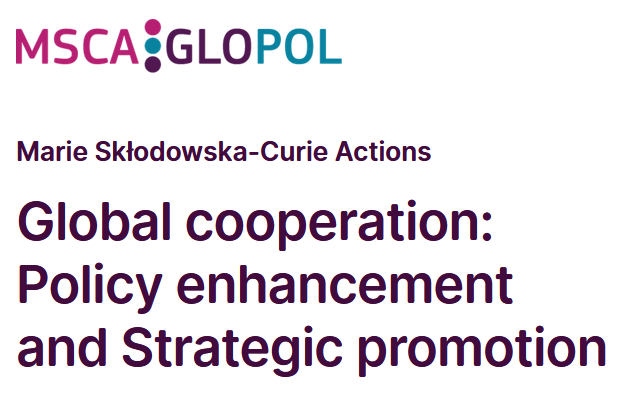MSCA-GLOPOL (Marie Skłodowska-Curie Actions Global Cooperation: Policy Enhancement and Strategic Promotion) is a 36-month EU-funded initiative running from 2025 to 2028 under Horizon Europe. Led by PRACSIS and the Marie Curie Alumni Association (MCAA), the project aims to strengthen international research and innovation collaboration between the EU and 20 partner countries across 6 strategic regions, including the Western Balkans.
The project works directly with research institutions, funding organisations, and policymakers to enhance participation in MSCA programmes and foster strategic partnerships that benefit researchers, institutions, and the broader research community.
Who is the project for?
The project is particularly interested in hearing from:
- Research institutions (universities, research centres, both academic and non-academic organisations)
- National research funding organisations and policymakers
- Organisations involved in MSCA or other EU-funded research programmes
- MSCA National Contact Points, EURAXESS representatives, and EU Delegation staff
- Research support professionals and managers
How can you engage with the project?
Over the next three years, the project will be reaching out to stakeholders in the Western Balkans region to:
- Complete surveys about cooperation trends, challenges in your research ecosystem, and the effectiveness of existing support mechanisms for MSCA (approximately 25-30 minutes, once or twice during the project)
- Participate in focus group discussions on themes like increasing institutional participation or showcasing success stories
- Join regional coordination groups to align MSCA promotional activities across National Contact Points, EURAXESS offices, EU Delegations, and other key actors
- Share information about relevant organisations, events, and opportunities in your network
What you’ll receive in return
Your participation brings concrete benefits:
Training and capacity building: Online training sessions, regional flagship events with European experts, and access to Best Practice Forums where MSCA National Contact Points and EURAXESS representatives share good practices on various topics (e.g., communication/promotion).
Practical support: Tailored promotional materials, up-to-date MSCA call information, guidance for newcomers to the programme, and information on synergies with other EU programmes like Erasmus+.
Policy influence: Your insights will inform policy advice to the European Commission for joint committee meetings and regional dialogues, ultimately benefiting your research community through better-informed MSCA cooperation frameworks.
Your Regional Liaison Officer
The project has Regional Liaison Officers positioned across all target geographies, including the Western Balkans. These are local experts with deep knowledge of the national and regional research landscape. Your RLO will be your direct point of contact and will:
- Engage with you and other stakeholders in your region
- Facilitate coordination between local MSCA information networks
- Support the development of promotional strategies tailored to your needs
- Gather insights through surveys and focus groups
- Connect you with other stakeholders and opportunities
For Western Balkans, the Regional Liaison Officer is Prof Dalibor Drljaca (dalibor.drljaca@pracsis.be)
Get involved
Whether you represent a research institution seeking to strengthen international partnerships, a funding organisation developing strategies for international cooperation, or a policy body shaping research and innovation frameworks, the project invite you to join this three-year initiative.
Contact: dalibor.drljaca@pracsis.be or contact@msca-glopol.eu
Website: https://msca-glopol.eu
Follow us: LinkedIn (msca-glopol) | Bluesky (msca-glopol.bsky.social)
Funded by the European Union under Grant Agreement 101202507. Views and opinions expressed are those of the author(s) only and do not necessarily reflect those of the European Union or the European Research Executive Agency (REA). Neither the European Union nor the REA can be held responsible for them.

